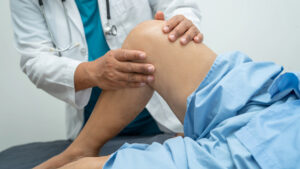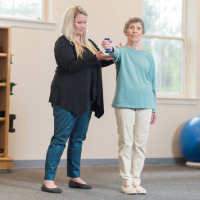Written by Lauren Wills, DPT
Article
Joint replacement, surgery
 There are over 2.8 million total hip and knee replacements performed in the US each year and over 50,000 total shoulder replacements occurring over that same time frame, making total joint replacements one of the most common elective orthopedic procedures in the United States. Whether your surgery is already scheduled, or you are a candidate waiting to schedule, there are a variety of things you can be doing in the weeks/months leading up to your procedure to set you up for success when it’s over.
There are over 2.8 million total hip and knee replacements performed in the US each year and over 50,000 total shoulder replacements occurring over that same time frame, making total joint replacements one of the most common elective orthopedic procedures in the United States. Whether your surgery is already scheduled, or you are a candidate waiting to schedule, there are a variety of things you can be doing in the weeks/months leading up to your procedure to set you up for success when it’s over.
 1. Prepare your home – this includes removing trip/fall hazards (rugs, cords, etc.), making sure hallways are well lit with nightlights, put things that you use all the time on lower shelves to reduce reaching, pre make meals to freeze and put heavier items (like a gallon of milk) into smaller containers to avoid heavy lifting.
1. Prepare your home – this includes removing trip/fall hazards (rugs, cords, etc.), making sure hallways are well lit with nightlights, put things that you use all the time on lower shelves to reduce reaching, pre make meals to freeze and put heavier items (like a gallon of milk) into smaller containers to avoid heavy lifting.
 2. Obtain Assistive Devices – Having a walker, cane, toilet raisers, shower chairs, grab bars, and a grabber ready to go will make life much easier in those first few days to weeks after surgery.
2. Obtain Assistive Devices – Having a walker, cane, toilet raisers, shower chairs, grab bars, and a grabber ready to go will make life much easier in those first few days to weeks after surgery.
 3. Arrange your transportation – it will be several weeks after surgery, and longer if it a R sided procedure, until you are driving again. Make sure you have reliable transportation to and from your surgery site as well as someone who will be able to help you get to/from physical therapy appointments 3x/week and any follow up doctor visits until you are cleared to drive.
3. Arrange your transportation – it will be several weeks after surgery, and longer if it a R sided procedure, until you are driving again. Make sure you have reliable transportation to and from your surgery site as well as someone who will be able to help you get to/from physical therapy appointments 3x/week and any follow up doctor visits until you are cleared to drive.
4. Have cold packs ready to go to manage pain and swelling.
5. Keep clean sponges and wash cloths handy for sponge baths after surgery.
6. Check your wardrobe – if having a shoulder surgery, you’ll want to make sure that you have button or zipper tops available, sweatpants/easy to pull on bottoms if you are having a hip or knee procedure.
7. Quit smoking – nicotine impacts healing as well as leads to additional post-operative complications.
8. Keep your skin healthy and practice good hand hygiene – cuts, burns (including sunburn), abrasions increase your risk of developing an infection. An illness on the day of surgery could lead to your surgery being postponed.
9. Maintain a healthy weight – for every extra pound of body fat, that is an added 7 lbs. of pressure on the knee joints, and 9 lbs. on the ankles. Make it a goal to stay as active as possible with low impact activities. Increased body fat also puts you at risk for post-operative complications.
10. Schedule your pre and post operative physical therapy – preoperative therapy will help you stay active leading up to surgery and will allow you to get up and moving faster post-operatively by helping to keep the joints mobile and the muscles strong. Both aquatic and traditional land-based outpatient physical therapy is an option to help you complete low impact activities prior to surgery.
If you are preparing for any type of joint replacement surgery and have questions or concerns please give us a call for a FREE phone consultation. Our pre & post-surgery 1-on-1 treatments emphasize hands-on techniques that are proven to result in better outcomes. We work closely with your surgeon to create an efficient and effective path to a faster recovery, while helping you manage your pain without the excessive use of prescription drugs.







